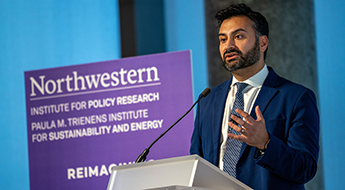Faculty Spotlight: Crystal Clark
Psychiatrist and IPR associate challenges stigmas of mental illness in pregnant women
Get all our news
I found that a lot of women who were coming into the OB-GYN office were struggling with other issues that were not directly related to their physical health.”
Crystal Clark
Psychiatrist and behavioral scientist and IPR associate

In medical school, psychiatrist and IPR associate Crystal T. Clark found herself torn between two passions: psychiatry, and obstetrics and gynecology. Rather than make a difficult choice, she asked herself why she couldn’t combine, as she put it, “the best of both worlds.”
“I found that a lot of women who were coming into the OB-GYN office were struggling with other issues that were not directly related to their physical health,” Clark said.
This led her to specialize in perinatal psychiatry, a relatively new field focusing on women’s mental health at and around childbirth. Her decision to pursue it has led her to conduct groundbreaking research on the physiological connections between psychiatric and natal care, challenging long-standing stigmas around mothers struggling with mental illness. In doing so, she has helped to build an interdisciplinary research area that has clear policy implications for family health during pregnancy and beyond.
How medication affects the pregnant body
By combining a psychiatrist’s approach with her perinatal focus, Clark has illuminated the complex hormonal relationship between mental health treatment and pregnancy.
“I found myself intrigued by restoring the mental well-being of women during this vulnerable period. Research on this relationship has given us a new insight into how hormones, mental illness, and treatment intersect, and especially how to manage pharmacotherapy for these women, which is extremely important,” Clark said.
A recent study by Clark and her co-authors in the International Review of Psychiatry examined exposure to lithium in infants when consumed through breast milk. Lithium is one of the most widely used treatments for bipolar disorder. They concluded that recommendations need to be tailored to the individual needs of a woman and her child—something Clark says is frequently overlooked without interdisciplinary training.
“Without that specialized lens, women are frequently left alone in trying to figure out how best to manage their [mental] illness during pregnancy,” Clark said. “They’re often dealing with both OB-GYNs and psychiatrists who may not feel comfortable providing treatment or don't know what to do to best help them stay well and stay out of the hospital.”
Building the infrastructure for better care
According to Clark, medical benefits need to be extended for women who need psychiatric care during and after pregnancy, as well as greatly improving the infrastructure for treating them.

“In many states, Medicaid stops two months postpartum,” Clark said. “For the woman who has a positive screen for depression or anxiety post-birth and loses her insurance two months postpartum, it's very hard for her to access a perinatal psychiatrist. Furthermore, because there aren’t enough of us, even women with insurance may have a hard time finding a clinician with this expertise. ”
Clark is working to increase the number of these psychiatric specialists through two programs in the Feinberg School of Medicine: its psychiatry & behavioral sciences’ residency program, where she is associate director and leads the specialty electives in women’s health, and also the Perinatal and Women's Mental Health Fellowship, which provides comprehensive training in mental illnesses that overlap with childbirth as well as those that occur in relation to hormonal imbalances across a woman’s reproductive life cycle (e.g., premenstrual dysphoric disorder and perimenopause).
“We have a long way to go before we have enough people who are well-informed in this area,” Clark said.
“Those women who have Medicaid or don't have insurance aren’t likely to have access to a clinic with the specialized care needed or to find a clinician who understands this area very well,” she continued, “ we need policy that will expand access to care for all women with postpartum mental illness.”
Breaking the stigma around mental health treatment
Clark says that one of the major roadblocks to building an infrastructure of perinatal psychiatric care is the ongoing stigma around mental illness in pregnant women.
“I get a lot of patients who are abandoned by their psychiatrists and scolded by their pediatricians,” Clark said. “I have patients who need to stay on lithium or other psychotropic drugs and want to breastfeed, and they’ll hear from their pediatrician ‘absolutely not.’”
[T]here needs to be much more education not just for the public, but for my colleagues who are taking care of these women.”
Clark described how establishing a clear cause-and-effect relationship between mental health treatment and infant and perinatal health outcomes can help both mothers and doctors feel confident in their treatment in the face of that stigma.
“I do a lot of educating of my colleagues,” Clark said. “One size does not fit all. There might be a baby who is more sensitive to medication exposure through breast milk, for example, and we won’t know at first but we can monitor for those signs and adjust the approach to treatment accordingly. Commonly, babies tolerate exposure to medication in breastmilk — which is most often less than their exposure in pregnancy — without any known adverse effects.”
Clark shares that research to better characterize breastmilk exposure to psychotropics and infant outcomes is overdue. She's currently working with national organizations like the American College of Obstetrics and Gynecologists to promote a deeper understanding of her research in the maternal health community. She says that although they’ve made big strides, it’s just the beginning of a much larger project.
“We definitely have more work to do,” Clark said. “We’re trying to reach a point where it’s not just the people I’m on the committee with pushing for national change, but where instead we're working collaboratively with international experts for global change that improves care for perinatal women.”
Crystal T. Clark, MD, MSc. is Assistant Professor of Psychiatry and Behavioral Sciences and Obstetrics and Gynecology and an IPR associate.
Published: April 29, 2020.


